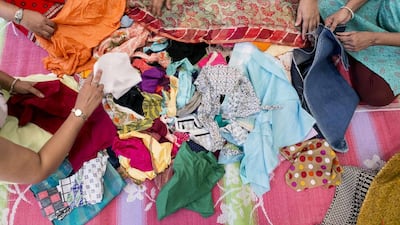A social group in Dubai aims to make the lives of the poor and needy in the UAE a little more comfortable.
Save Scrap and Sew collects leftover cloth from tailors to make items for the less fortunate – including bedsheets and bags for underprivileged families and soft pillows for construction workers to rest their heads during their midday break.
Set up last year by Dubai-based university professor Shambavi Rajagopal, the initiative has gained momentum, with several meetups held in Dubai during which members spend a few hours sorting, cutting and stitching items together.
“Last year, I noticed my tailor carrying two big bags of scrap material to trash and I was shocked at all the wasted cloth,” says Rajagopal, a 49-year-old from India.
“That was when I thought we could do something with it and passed the idea around. A few friends got together for regular sessions to sort out the scrap pieces, which took a while. Once we had done that, we decided to make bedsheets because they have utility value for anyone to use.”
The group now has more than 100 members. Schoolchildren are also involved with various activities, including collecting the material and distributing the finished items.
The group began making pillows recently after noticing construction workers shuffle uncomfortably on makeshift cushions during their breaks.
“You usually see them using absolutely anything as a headrest,” Rajagopal says. “So that is when I decided to make these small 8x11-inch pillows that they can carry in their bags. It makes their lives a little easier.”
The pillows have a cotton base to prevent excessive sweating and also solve a practical problem the Save, Scrap and Sew team often face.
“We have had an issue with the small scraps that we can’t make anything out of,” Rajagopal says.
“They work perfectly for the pillow stuffings. We call these our support pillows because we never know who they’ll end up supporting.”
“These are no-frills pillows,” Rajagopal says. “No zips, buttons or any embellishment because that requires higher levels of sewing skills and we want to keep it simple to involve everyone.”
The group has already distributed close to 1000 pillows at construction sites in Dubai.
Items have also been distributed internationally in government-run schools and villages in India and South Africa.
Rajagopal says the group does not accept old or used material.
“No old clothes, no old sheets and no personal material – only what comes from a tailor,” she says.
“But even then, we don’t use material that is resized and refitted because that has been worn, too.”
Save, Scrap and Sew is not interested in creating fancy items that can be sold for a profit.
“We aren’t looking to sell these to raise money for a charity,” Rajagopal says.
“I feel like the tailor is giving it to us in good faith and for free, so there is an ethical issue with me selling it.”
Instead, the aim is to create products of practical value for those who need them most.
“When you are hungry, you need food, not money,” Rajagopal says. “In the same way, we make these bags, pillows and bedsheets for people who are in desperate need of these things.”
Rajagopal also conducts sewing workshops for schoolchildren as part of the initiative.
“A lot of them need to do community service as part of their school programme,” she says. “So they come to these sessions and I teach them how to do basic sewing.”
Parents of children with special needs are especially encouraged to get involved with the group.
“We have lots of work that doesn’t involve sewing, such as cutting the cloth into specific dimensions,” Rajagopal says. “This is a good way to get them involved.”
As a sign of how the Save, Scrap and Sew community maintains its inclusive nature, Rajagopal points to the simplicity of the tasks.
“One of the best things about working with scraps is that there are no mistakes with them,” she says. “But the end result is always beautiful.”
• To get involved with Save Scrap and Sew, follow the group’s Facebook page at www.facebook.com/SSSbuddies or visit www.savescrapnsew.com
aahmed@thenational.ae

